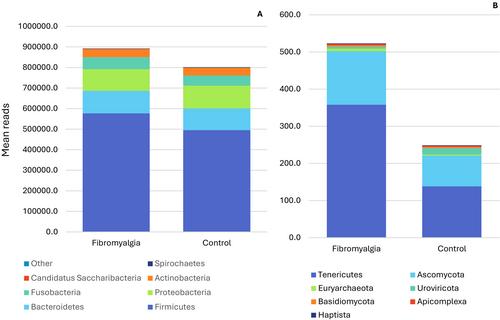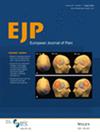Characterisation of the Oral Microbiome in Women With Fibromyalgia: An Observational Case–Control Study
Abstract
Background
Fibromyalgia is a complex disorder, associated with a range of symptoms, not least of which is chronic, widespread pain. Although several reports have brought the role of oral health in systemic diseases into recent focus, the oral microbiome in fibromyalgia is unexplored. The aim of this study was to compare oral health and the oral microbiome in women with fibromyalgia with that of age-matched controls.
Methods
This observational case–control study recruited adult non-smoking, non-diabetic women meeting American College of Rheumatology (ACR) 2016 fibromyalgia criteria and age-matched controls living in New Zealand. Metatranscriptomic data from salivary samples were evaluated for differences at phyla, genus and species level, with adjustment for age, BMI and added dietary sugar intake. Results were examined against self-reported oral health.
Results
No differences were seen in richness or diversity of oral species between the fibromyalgia (n = 106) and control (n = 52) groups. Women with fibromyalgia had significantly lower scores on measures of oral health, which were associated with subtle shifts in the core oral microbiome. Several oral genera were significantly correlated with oral health scores (q ≤ 0.05). Higher relative abundance of the periopathogens Prevotella denticola and Solobacterium moorei was apparent in women with fibromyalgia.
Conclusion
Significant differences in oral health and the oral microbiome were seen in women with fibromyalgia. This novel discovery presents an intriguing hypothesis that invites deeper investigation into the interaction between oral health and the oral microbiome in this population, and whether these influence the aetiology and/or symptoms of fibromyalgia in women.
Significance
This study presents the first evidence of altered oral microbiome in women with fibromyalgia, revealing significant disparities in oral health and the microbiome. The observed overabundance of periopathogens and the underrepresentation of commensals compared to a control group suggest intriguing potential links between the oral microbiome and fibromyalgia symptoms. These findings indicate that enhancing oral health may have broader implications for disease management and lay a robust foundation for further exploration of oral–systemic interactions in fibromyalgia.


 求助内容:
求助内容: 应助结果提醒方式:
应助结果提醒方式:


